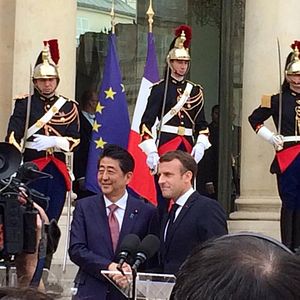There is a paradox in France-Japan relations. While both countries share many positions and have repeatedly expressed the same concerns about the global challenges facing the world, Japan is the only major strategic partner of France in Asia that President Emmanuel Macron has not yet visited. This will change in June, however, when Macron will pay an official visit to Japan before the Osaka G-20 meeting. The size and power asymmetry explain Paris’ initial focus on China, although there is a welcome rebalancing underway, based on an increased awareness in Paris of the limits of the Chinese partnership at both the economic and strategic levels.
At the same time, the year of “Japonisme” in France was a real success, celebrating the constant interest of the French public in Japanese culture in all its dimensions, from mangas to Noh theater. There is a traditional mutual interest in Japan for French culture, which feeds the sustained success of the French luxury industries. A season of French culture will be organized in Japan in 2019.
At the economic level, Tokyo’s signature of a free trade agreement with the European Union in 2018 confirms the considerable potential for trade development, particularly in the agri-food sector. After years of relative lack of interest, when China took the front seat, major research cooperation projects in the telecommunications or artificial intelligence sectors, also based on a common preoccupation for norms setting, are also once again being launched by major industrial groups.
2019 could thus be the year of Franco-Japanese relations. In June, Japan will chair the G-20 Summit in Osaka for the first time, and France will chair the G-7 Summit in Madrid in August. For both powers, this is an opportunity to assert their global influence and role on the international scene. As underlined by Macron in the press conference that followed bilateral talks in Paris this week with Prime Minister Shinzo Abe, their positions are very similar, based on the democratic values of freedom and openness and clearly opposed to authoritarianism and protectionism. These underline the specificity and commonalities of the two countries.
For Paris as for Tokyo, it is also a question of highlighting the points of convergence between Japan and the European Union in opposition to the Chinese power, a “systemic rival” according to the European Commission, where the absolute control of the Party-state is increasing. More discreetly, the United States, hostile to any binding multilateral agreement and potentially opened to a bilateral trade “deal,” is also a focus of both countries’ concerns.
Abe’s visit to Paris took place in this context of preparation for major international summits. Abe needed to clarify his positions in a European tour that will take him to Slovakia and Italy, among other places. Significantly, these countries are also the target of Beijing’s charm offensive, which attempts to divide the European Union by targeting countries that are economically weakened or politically isolated.
For the agenda of the two summits, Japan, like France, emphasizes human development, equality, democracy, the reasoned use of new technologies like AI based on democratic norms, climate, and a renewed partnership with Africa. All these elements are at the heart of the concept of “human security,” beyond the scope of the military. At the G-7, Paris emphasizes stability and cooperation in the fight against terrorism; at the G-20 Tokyo stresses the need to provide “quality” infrastructures, to distinguish itself from the exclusively quantitative appeal and the risks attached to projects related to Beijing’s Belt and Road strategy. For both, the stress is on “sustainable development,” including the climate change dimension, and human development.
However, there is a point of difference, in reality, if not in the official discourse. For France at the G-7, gender equality, and the role of women at all levels occupy a prominent place. The Japanese prime minister had made the building of a Japan where “women shine” a campaign slogan, but Tokyo remains in a very bad position (114th out of 144, while France is in 11th place) on the gender equality scale published by the OECD. This is one of the significant shortcomings of a Japanese model that has difficulties in escaping traditional social constraints.
However, one subject should not oppose Paris and Tokyo, even if it affects Japan’s international image — namely the Carlos Ghosn case. The announcement of a new indictment of the former president of Renault-Nissan on the eve of the meeting between Macron and Abe was not a bright move, but Japan is a democracy and relations between France and Japan are too essential to be called into question by a private law court case. Paris and Tokyo share the same interests — including the pursuit of a fruitful partnership between Renault and Nissan — and the same strategic vision, particularly in the Indo-Pacific, mentioned explicitly by Macron. France is the only country in Europe to have direct sovereign interests and a significant role to play in the Indo-Pacific region, including in the security realm. This complementarity must remain the basis for increased exchanges and cooperation in many fields in the context of a global situation under challenge.
Dr. Valérie Niquet is head of the Asia Program at the Foundation for Strategic Research and a Senior Research Fellow at the Japan Institute of International Affairs.

































